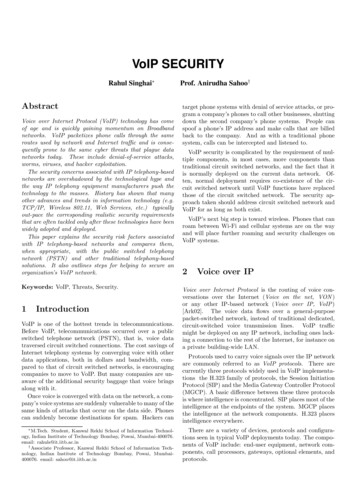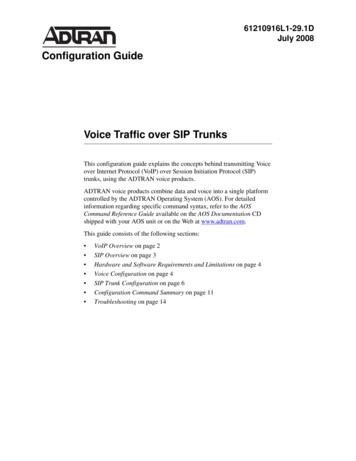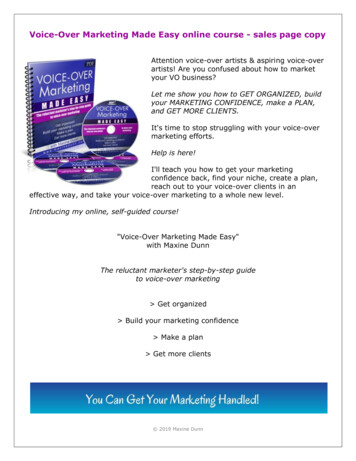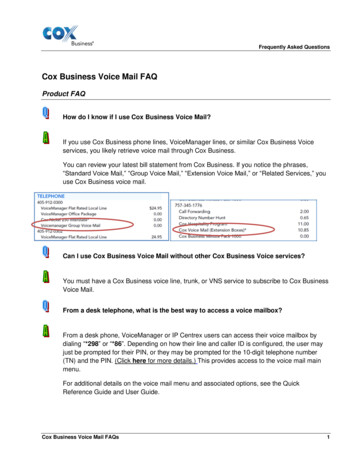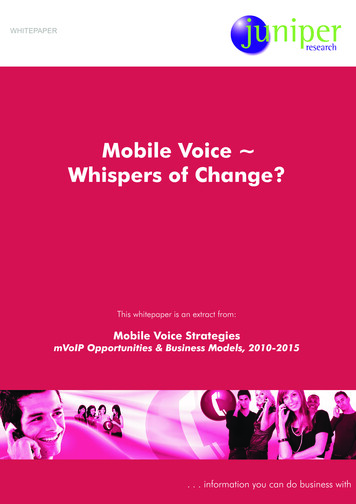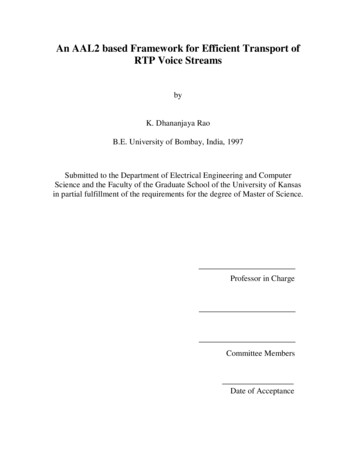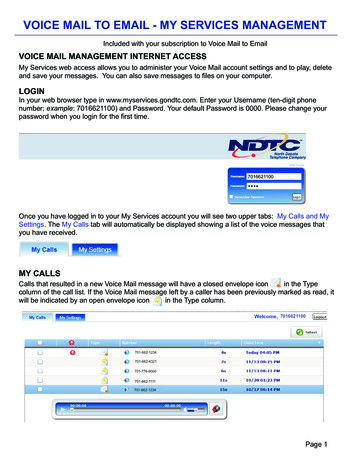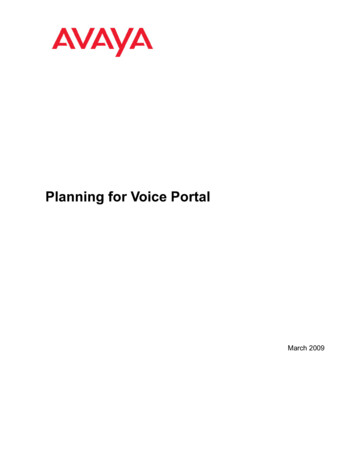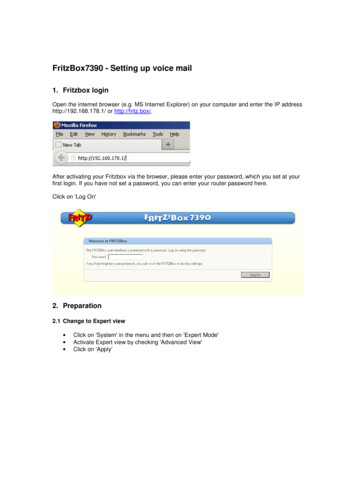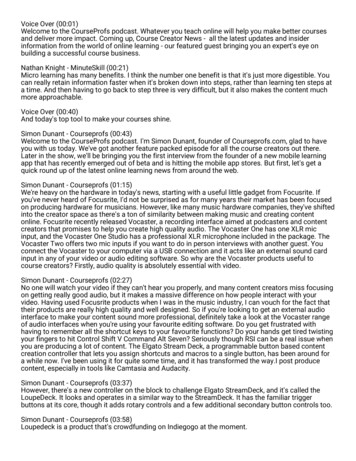
Transcription
Voice Over (00:01)Welcome to the CourseProfs podcast. Whatever you teach online will help you make better coursesand deliver more impact. Coming up, Course Creator News - all the latest updates and insiderinformation from the world of online learning - our featured guest bringing you an expert's eye onbuilding a successful course business.Nathan Knight - MinuteSkill (00:21)Micro learning has many benefits. I think the number one benefit is that it's just more digestible. Youcan really retain information faster when it's broken down into steps, rather than learning ten steps ata time. And then having to go back to step three is very difficult, but it also makes the content muchmore approachable.Voice Over (00:40)And today's top tool to make your courses shine.Simon Dunant - Courseprofs (00:43)Welcome to the CourseProfs podcast. I'm Simon Dunant, founder of Courseprofs.com, glad to haveyou with us today. We've got another feature packed episode for all the course creators out there.Later in the show, we'll be bringing you the first interview from the founder of a new mobile learningapp that has recently emerged out of beta and is hitting the mobile app stores. But first, let's get aquick round up of the latest online learning news from around the web.Simon Dunant - Courseprofs (01:15)We're heavy on the hardware in today's news, starting with a useful little gadget from Focusrite. Ifyou've never heard of Focusrite, I'd not be surprised as for many years their market has been focusedon producing hardware for musicians. However, like many music hardware companies, they've shiftedinto the creator space as there's a ton of similarity between making music and creating contentonline. Focusrite recently released Vocaster, a recording interface aimed at podcasters and contentcreators that promises to help you create high quality audio. The Vocaster One has one XLR micinput, and the Vocaster One Studio has a professional XLR microphone included in the package. TheVocaster Two offers two mic inputs if you want to do in person interviews with another guest. Youconnect the Vocaster to your computer via a USB connection and it acts like an external sound cardinput in any of your video or audio editing software. So why are the Vocaster products useful tocourse creators? Firstly, audio quality is absolutely essential with video.Simon Dunant - Courseprofs (02:27)No one will watch your video if they can't hear you properly, and many content creators miss focusingon getting really good audio, but it makes a massive difference on how people interact with yourvideo. Having used Focusrite products when I was in the music industry, I can vouch for the fact thattheir products are really high quality and well designed. So if you're looking to get an external audiointerface to make your content sound more professional, definitely take a look at the Vocaster rangeof audio interfaces when you're using your favourite editing software. Do you get frustrated withhaving to remember all the shortcut keys to your favourite functions? Do your hands get tired twistingyour fingers to hit Control Shift V Command Alt Seven? Seriously though RSI can be a real issue whenyou are producing a lot of content. The Elgato Stream Deck, a programmable button based contentcreation controller that lets you assign shortcuts and macros to a single button, has been around fora while now. I've been using it for quite some time, and it has transformed the way.I post producecontent, especially in tools like Camtasia and Audacity.Simon Dunant - Courseprofs (03:37)However, there's a new controller on the block to challenge Elgato StreamDeck, and it's called theLoupeDeck. It looks and operates in a similar way to the StreamDeck. It has the familiar triggerbuttons at its core, though it adds rotary controls and a few additional secondary button controls too.Simon Dunant - Courseprofs (03:58)Loupedeck is a product that's crowdfunding on Indiegogo at the moment.
Simon Dunant - Courseprofs (04:02)However, Loopdeck are not a start up. They're a fully fledged company with other hardware productsfor content creators too, and they've been around for a while, so it's a bit odd that they decided tolaunch the Loupedeck Live on Indiegogo. They do offer a discount if you order it on Indiegogo though,so I think they probably used it as a marketing platform to bring the product to market.Simon Dunant - Courseprofs (04:26)Now, being a StreamDeck user already, I was curious whether the Loupedeck's additional rotarybuttons would be useful mapped to various volume functions within your software. The LoupedeckLive does come in at over double the price of Elgato's equivalent StreamDeck offering though. So ifyou're in the market for a controller like this, and if you value the health of your hands and fingers longterm, and you should do, be sure to check out the features of each of those products I mentioned tomake sure they'll be helpful for your editing and post production set up.Simon Dunant - Courseprofs (04:59)I personally prefer Elgato Stream Deck, but I do think the Loop Deck is worth a look. If you haven'talready got one of these types of controllers.Simon Dunant - Courseprofs (05:07)Let's leave hardware behind and get back to the software. TechSmith have released Camtasia 2022,and I've recently downloaded and installed it. There's a ton of minor improvements, not too manymajor release items this time around, but the ones that made it in production are definitely worth alook. Firstly, Camtasia have added input supports for virtual cameras and camera capture cards. Thisshould help bring in new users to Camtasia, which has always been seen in some circles as primarilya tool to capture on screen video.Simon Dunant - Courseprofs (05:42)I've always used it for pieces to camera too, and it's always been very capable, but hopefully this willraise it further up the echalances of professional video editing tools.Simon Dunant - Courseprofs (05:53)Cursors get a makeover in Camtasia 2022 with vector replacements for mouse pointers makingscreencast to follow along software demos look sharper, and you now also have the ability to editcursor paths that have been recorded, or add your own cursor paths to any image, video or groupwithin the cursor path. Creator Effect.Simon Dunant - Courseprofs (06:14)Other inclusions in this release are a tighter integration with TechSmith's own audio audio software, anew home section experience and what I think is the most valuable, a whole bunch of new libraryassets. These assets are worth the yearly maintenance package cost alone. And I'm really glad to seethat. TechSmith have released these library additions, including over 1000 new call outs, animationseffects and title assets. There's icons, overlays and much, much more. They are nicely designed andreally easy to customise. Colours can be simply and quickly changed to your own brand's palette andI'd love to see more of these released every year. TechSmith.Simon Dunant - Courseprofs (06:54)As I always say, Camtasia really is our video and screencast editor of choice and you can get yourselfa free 14 day trial and road test it yourself at go dot courseprofit dot com slash TechSmith.Simon Dunant - Courseprofs (07:13)On today's show, we're exploring the future of online learning. Now, many of you watching this maywell have created a course in the traditional linear fashion. You plan out a structure for your course,you create the content in bulk, get yourself signed up to a course platform, upload the content andlaunch your course to the world. Well, that's the way online learning has been for a long time. But nowa new app to the online learning scene is ripping up the rulebook and offering a new way for onlineeducators to engage with their learners. The app that I'm talking about is called MinuteSkill, a sociallearning platform that promises on demand learning in bite sized videos to help you become a better
professional or creative. To tell us more about the app, I'm really excited to talk to entrepreneur andCEO of MinuteSkill, Nathan Knight. Nathan, welcome to the show.Nathan Knight - MinuteSkill (08:08)Hi Simon, thank you so much for having me on.Simon Dunant - Courseprofs (08:10)You're most welcome. It's very exciting. Really keen to find out more about the MinuteSkill app, butbefore we do, I want to jump in at the start, what inspired you to actually build a startup around onlinelearning, especially mobile, and tell our audience a bit about the journey you took to come up with theactual idea to build MinuteSkill as a mobile app?Nathan Knight - MinuteSkill (08:35)Yeah, so MinuteSkill, the idea itself started from my co founder Camila, and it was really because wesaw that online learning was really more so geared towards being a simulated virtual classroom andthat we noticed that younger people in particular started dropping off the engagement with theseplatforms and this type of delivery of the content was really low. And so around 95% of peopleactually don't finish courses on these online platforms and they end up going to social media instead.And so we started to dive deeper into this and when we asked people about this, we got a lot offeedback saying they hate learning on social media. It's chaotic, it's distracting, it's not safe. Theywish there was a more structured but still social learning platform and that's kind of what birthedminute skill really is. Minute Skill is this new way to learn online. It's community driven, it's mobile, it'sshort, it's a platform where people can learn continuously and how they really want to learn.Simon Dunant - Courseprofs (09:34)As you say, many more people are moving to social to answer their questions. I mean, obviouslyGoogle owns YouTube, so when people Google a question, they come up with stuff that's on YouTubeas well because obviously it's a linked property of Google's. But as you say, how do you have the trustin what you're learning? And also, you're right, it's chaotic. There's tonnes of ads now and people aretrying to drive you to websites, et cetera. But the key thing is it's also unguided. So you might find outperhaps the one item you were looking for and to find more, it's pretty difficult to kind of have that in astructured format, necessarily. So you mentioned social learning. I love this idea of social learningsince that's the core focus of minute skill. How would you kind of define what social learning meansto somebody? And what are some of the concepts that are different with social learning, as opposedto, as you mentioned, what we might think of traditional online learning formats involving more formalguided learning management systems.Nathan Knight - MinuteSkill (10:45)So at MinuteSkill we define social learning, I'd say more as community oriented learning, so we knowthat people learn better when they learn together. That's how it is in real life. And yet this hasn't reallybeen effectively done digitally yet. So traditional learning, of course, it's just you, your laptop and thespeaker on the laptop, but MinuteSkill really focuses on the social interaction between peers ratherthan that top down lecture style format that we're discussing. So, for example, think about like reallyeasily sharing, connecting and learning at the same time collaboratively with your team or maybe inMinuteSkill you're joining a community on a certain topic that you're trying to learn with like mindedindividuals and you can discuss the goals and improve yourself together, watch content together andget things done together. That's kind of the thesis behind MinuteSkill's social learning aspect.Simon Dunant - Courseprofs (11:41)So basically we're talking cohorts and effectively, we're talking taking some inspiration from kind ofwatch parties on things like Facebook, I'd say, as well, which is amazing. Now, you also talk aboutmicrolearning. I mean, this has been a buzzword for a while and certainly traditional kind of learningmanagement systems have tried to push microlearning as a content format. Certainly attention spansare getting shorter, probably because of the rise of things like YouTube and social media and that'sobviously moving over into e-learning. Micro learning is what I see as a big part of Minute Skill shortsessions of learning as opposed to the longer form content. What do you think some of the benefitsof micro learning are for the learner?
Nathan Knight - MinuteSkill (12:33)Yeah. So we are, of course, huge fans of micro learning coming up in the generation that we did andjust the world around us. And micro learning has many benefits. I think the number one benefit is thatit's just more digestible. You can really retain information faster when it's broken down into stepsrather than learning ten steps at a time and then having to go back to step three. It's very difficult, butit also makes the content much more approachable and easily searchable, which we're finding outnow. So, for example, you can find what you need, like exactly what you need much easier and fasterthan having to stick to a really long video at the same time. Your emotions about this, you don't feelas overwhelmed when you see like an eight hour lecture on a topic that you want to apply right now.You don't feel that defeated feeling of just like oh my gosh, I have to get through 8 hours before I cando something. It's like I have eight minutes and I can learn how to do it and then apply it right away.Building on that, it just makes it more actionable.Nathan Knight - MinuteSkill (13:35)So of course you can share a three minute video and actually apply that three minute video in realtime rather than having to learn an entire topic at once and then hopefully down the road months lateryou could apply it. So of course, minute scale, we leverage that micro learning, we call it bite sizedlearning. We string them together in a series so you can still dive deeper into topics, but it's just stepwise. And I can go back, as I said, to step three and so forth and things like that. So it's just moreconsumable and actionable version of long form lectures.Simon Dunant - Courseprofs (14:09)That makes total sense because obviously people learn by doing rather than learning by watching andas you say, it makes it much more accessible. And I love that term bite size. So let's dive into theMinute Skill app itself. Are there any kind of particular topics or niches that you're focusing on? Whatkind of content can learners expect from the Minute Skill app?Nathan Knight - MinuteSkill (14:37)So right now we're focused on founders, business owners, professional type content, so things likecash flow management, financials, how to pitch VCs for example, how to build an MVP, all sorts ofprofessional business type content like that. We have gotten interest from all sorts of differentstakeholders and so we will definitely be expanding our content down the road. But for now, rightwhen you enter the app, that's the type of content you'll see.Simon Dunant - Courseprofs (15:04)So entrepreneurs, founders and in the current economy that more and more people are looking to bemore entrepreneurial, to increase their income. And one of my favourite sayings is teach what youknow and change a life and people are making an effort to kind of teach people, as you say, in thecommunity and more and more people are realising that they've got a lot of knowledge to share andapps like Minute Skill a great way for people to dive in and share their experience. Everyone canbecome a teacher now.Simon Dunant - Courseprofs (15:42)So what opportunities do you think there are for course creators in Minute Skill? How would youadvise course creators to approach teaching in the app if they wanted to get started kind of as atutor?Nathan Knight - MinuteSkill (15:54)I think the first, most important thing about Minute Skill is that the creators actually retain their IP andwe did that purposely because we saw how social media apps usually treat creators on otherplatforms. Often times creators feel exploited. Those platforms take the IP, they take all the valuereally, and they give very little back in terms of monetization for the creators. So Minute Skill creatorsretain the IP. We promote creators to use minute scale for lead generation as well to their otherassets and they can also monetize their content. And we're looking to build a pay per view type modeljust to give the most value back to creators. I think the next most important thing about Minute Skill isthat we keep bringing in more organisations and we're looking to connect those organisations to
actually commission work from these creators to get that custom or specific content for theirorganisations learners. So we're really trying to build out an ecosystem where the creators get valuefor the work and then they can get connected to this entire ecosystem where they can continue toprovide more and more to organisations like that. So yeah, that's what I would suggest.Simon Dunant - Courseprofs (17:05)Yeah. And you've touched on kind of the next question that followed on from that was that coursecreators can find their-self on some course platforms, say relinquishing IP or kind of not getting thegreatest value. You mentioned the monetization strategy. Obviously you're in a very early stages atthe moment, so just beta, perhaps even in beta. But further down the line, what kind of monetizationstrategy? Because this is the question a lot of course creators will kind of have. What kind ofmonetization strategies do you have in mind as you grow? Do you think course creators will be able tokind of effectively build a business on the Minute Skill platform of their own?Nathan Knight - MinuteSkill (17:52)Yeah, that's the goal. So for creators, they can monetize their videos, entire series, their entire profile, Ithink to build a business what we're building in is to be able to monetize an entire cohort, so similar tohow you would set up an LMS with a cohort and you get your learners and you're paying for thatplatform deliver content on Minute Skill, we allow you to monetize that cohort so people would pay toget access into your content and you still get to deliver it in the social and immersive and engagingenvironment. So we definitely think that down the road there'll be an opportunity for creators to havetheir entire business on Minute Skill.Simon Dunant - Courseprofs (18:31)What about peer to peer learning? This is something we touched on a little bit earlier, but do you thinkan app like Minute Skill can encourage students to kind of discover that they can become a teacherand share knowledge between other users, effectively becoming a teacher to others?Nathan Knight - MinuteSkill (18:46)Oh, absolutely. That's exactly what Minute Skill is intended to do. We have a community featurecoming out, so if you go to our community tab, people can really easily ask questions and people canreally easily reply to those questions and answer them. You can discuss topics, share resources, putyour own tutorials on, or just simple, how did I get through this? So, for example, a founder who justraised, they can put their whole journey in this community and say, hey, guys, you want to hear mystory about how I just raised a pre-seed? And they can do this through video, through text, voice, all ofthat.Simon Dunant - Courseprofs (19:22)Amazing. I know we talked about social networks earlier and social networks can have a veryinfluential effect on its users. Now, clearly, Minute Skills mission is wholly a positive one, makinglearning and growth much more addictive. And that can only be a good thing. But how are you goingto approach moderating the Minute Skill platform to make sure that it does remain a safe space forusers to learn and interact in?Nathan Knight - MinuteSkill (19:47)Yeah, so right now we are meeting with every single creator that we have and really creating thatcontent as we scale. Of course, this is where we are investing heavily into algorithms to ensure thatthe community guidelines are met. This is because one thing social media really lacks that isnecessary to learn is the psychological safety. So knowing the content and the creators are reliable isvery important when a user goes to the content to actually learn. So we recognise that we not onlyneed to make Minute Skill this safe, but we also need to show how reliable the creators are. Theircredentials make it really clear that someone has experience in this area before you're even looking attheir videos. Kind of similar to how LinkedIn shows you someone's work experience so you knowthey're a real person versus other apps that have anonymous users.Simon Dunant - Courseprofs (20:39)That totally makes sense. So tell us about some of the teachers and the courses and content that are
on the Minute Skill platform so far, and what would you like to see more of if there are course creatorsout there that might want to get involved.Nathan Knight - MinuteSkill (20:53)Right now, I'm really happy to announce that we have partnered with the amazing content creatorSlideBean, the YouTube channel. They deliver really awesome foundational content for early stageentrepreneurs. We actually use their content to learn, like what a pitch deck was when we first startedour entrepreneurial journey. So it's really funny in full circle how they ended up back on our platform.But, yeah, I'd love to see more of these entrepreneurial creators. Anyone who's looking to pay itforward back to young entrepreneurs. I think the entrepreneurship industry is a knowledge industryand so it's really necessary to share what you know, back to other founders and help them getthrough it. So I'd love to see more of that and really just anyone with this experience who loves tocreate content and share their expertise, that is all that we're looking for.Simon Dunant - Courseprofs (21:41)Yeah, that sounds like a brilliant growth community that you're forging here. Now, I'm going to ask youa little bit more about yourself here and this last question, I ask it to all the guests that appear on thepodcast. We know that all our guests have worked really long and hard to get where they are today,and that's a journey and on that journey, they've had highs and lows. I'm sure Minute Skill has taken along time, certainly longer than people expect to come to fruition.Nathan Knight - MinuteSkill (22:11)Absolutely.Simon Dunant - Courseprofs (22:13)I can probably guarantee that it's brought you tonnes of valuable learning experiences. Is there kind ofone mantra or is there just some words of wisdom that you could share with our audience today thatyou kind of live by because of the journey you've had so far as an entrepreneur building this?Nathan Knight - MinuteSkill (22:33)Yeah, that's a really great question. So I probably say it's not the most experienced person or the bestperson in the room that succeeds, it's the person that doesn't give up, it's the person that wants tolearn rather than throw in the towel, that succeeds. And I can definitely say, coming from mybackground and being a very young entrepreneur, I'm never the most experienced person in the room,I'm never the best person or the smartest person in the room. But one thing that I have is I won't giveup. And I'm very resilient and determined to make this a success. And that has really propelled me.And I think that having that growth mindset is an incredibly valuable skill to have.Simon Dunant - Courseprofs (23:24)A great quote there about not being the smartest person in the room. I think whatever age you are,whatever background you come from, I think that is a great mantra, because it puts you in listeningmode, it puts you in learning mode, and that's the best place to be. So that's great. Don't be thesmartest person in the room. Love that. Okay, well, thanks for coming on the show today. It's beenbrilliant to hear about the growth of Minute Skill and what it does. If our audiences want to get startedon it and find out more about Minute Skill and dive in and perhaps even start teaching on it, where canour listeners connect with you and where can they find Minute Skill if they'd like to get in touch formore information about it?Nathan Knight - MinuteSkill (24:09)Yeah, so you could definitely reach out to me over LinkedIn at Nathan Knight. I love talking about this,so please don't hesitate to reach out. To get on the app. You can just download it. It's in the app andGoogle Play Store just search minutes ago. I think we're the only app named minutes ago, so it shouldbe easy to find other than that minuteskill.com, you can see all the information there and downloadthe app from there as well.Simon Dunant - Courseprofs (24:35)Excellent. So good luck with growing the app. Coursprofs wish you every success with Minute Skill
because I think it's very innovative and I think it's really refreshing to see a new direction for learningonline and everyone listening to this podcast, go check it out on the app stores. The links will also bein the show notes. So thanks again, Nathan, for coming on and telling us about the app.Nathan Knight - MinuteSkill (25:02)Awesome. Yeah. Thank you so much. It's been a lot of fun.Simon Dunant - Courseprofs (25:10)Do you wish you could brighten up your Course content with some really good looking graphics?Maybe some animations to engage your students? Well, you don't have to break the budget hiring agraphic designer. Look no further than a great resource called LottieFiles over at lottfiles.com. Youcan access thousands of free animations, and unlike stock graphics, you can fully customise these inthe LottieFiles site directly with their web based Lottie editor. You can really dig down into theanimation and change each component if you wish, or just use them straight out of the box if it fits. Ifyou want to add these animations into your video editor, you can also export them as MP4 and evenGIF files too. LottieFiles makes a great addition to your course pages or your course videos. I reallylove the site, so check it out for yourself at lottiefiles.com.Simon Dunant - Courseprofs (26:04)And don't forget, we have over 100 plus tools listed in our free Course Creators Toolbox over atcourseprofs.com, so sign up for that too at our website. Again, it's totally free to access.Simon Dunant - Courseprofs (26:17)That's all from Courseprofs this time around. I hope you've got a tonne of value out of this episode.Keep making progress with your Course business, and we'll see you next time.Voice Over (26:27)Thanks for tuning in to the Course Props podcast. We share our best stuff by email, subscribe, andstay in the know at courseprofs dot come slash podcast
creators that promises to help you create high quality audio. The Vocaster One has one XLR mic input, and the Vocaster One Studio has a professional XLR microphone included in the package. The Vocaster Two offers two mic inputs if you want to do in person interviews with another guest. You

